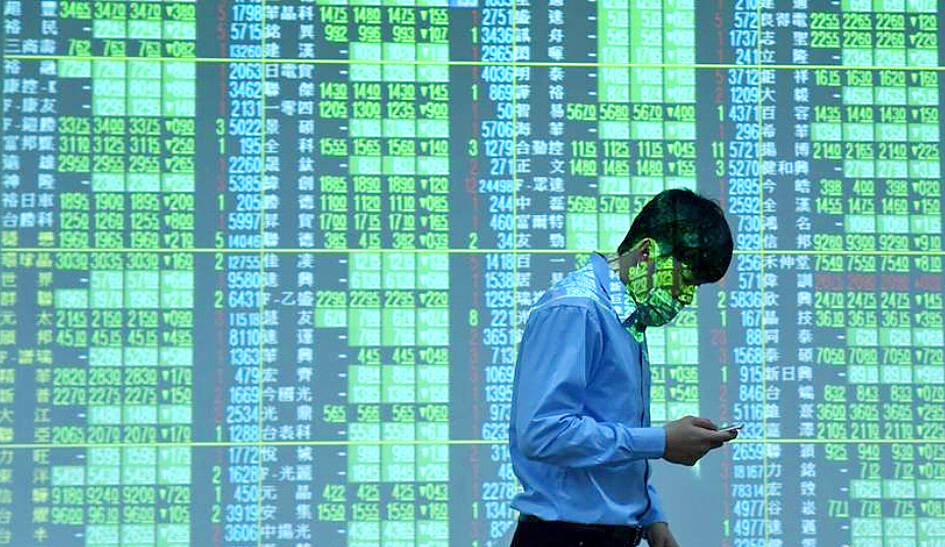The nation’s securities account balance, a gauge of retail investors’ confidence in local equities, fell to the lowest level in five months last month, as the TAIEX continued to consolidate and stock trading momentum slowed, the central bank said on Tuesday.
The securities account balance declined to NT$3.25 trillion (US$100.5 billion) from NT$3.35 trillion in the previous month, data compiled by the central bank showed.
It had dropped for the second straight month and hit its lowest since April, when the balance stood at NT$3.19 trillion, the data showed.

Photo: Taipei Times file photo
Foreign institutional investors’ New Taiwan dollar-denominated deposit balance also decreased to NT$185.5 billion last month, down for the second consecutive month and reaching the lowest in three-and-a-half years, the bank said in a report.
Retail investors accounted for 57.7 percent of the trading volume, compared with 57.8 percent one month earlier, while foreign institutional players accounted for 31.5 percent, down from 32.5 percent, it said.
Local investors were relatively cautious amid intensified market volatility last month, as the tech sector, especially artificial intelligence-related stocks, came under heavy pressure, Central Bank Department of Economic Research Deputy Director-General Tsai Hui-mei (蔡惠美) told the Chinese-language Economic Daily News yesterday.
Meanwhile, foreign institutional investors adjusted their TAIEX holdings amid rising concerns about global economic risks, particularly a weakening Chinese economy, and the continued depreciation of Asian currencies against the US dollar, Yuanta Securities Investment Consulting Co (元大投顧) said in a recent note.
The TAIEX averaged 17,072 points in July, but fell to 16,648 in August and dropped further to 16,570 last month, central bank data showed.
The securities account balance decreased by NT$203.9 billion in the past two months and foreign institutional investors net sold NT$188.9 billion of local shares over the same period.
The decline pushed M1B money supply — a narrower measurement of money in circulation, including currency and passbook savings deposits — down 0.27 percent from August, the central bank said in the same report on Tuesday.
On an annual basis, M1B grew 2.76 percent, the report said.
The broader M2 monetary aggregate — which includes M1B, time deposits, foreign-currency deposits and mutual funds — edged up 0.08 percent monthly and 5.98 percent annually, it added.
During the first nine months of the year, M1B rose 2.71 percent and M2 advanced 6.53 percent from a year earlier, the data showed.

When an apartment comes up for rent in Germany’s big cities, hundreds of prospective tenants often queue down the street to view it, but the acute shortage of affordable housing is getting scant attention ahead of today’s snap general election. “Housing is one of the main problems for people, but nobody talks about it, nobody takes it seriously,” said Andreas Ibel, president of Build Europe, an association representing housing developers. Migration and the sluggish economy top the list of voters’ concerns, but analysts say housing policy fails to break through as returns on investment take time to register, making the

NOT TO WORRY: Some people are concerned funds might continue moving out of the country, but the central bank said financial account outflows are not unusual in Taiwan Taiwan’s outbound investments hit a new high last year due to investments made by contract chipmaker Taiwan Semiconductor Manufacturing Co (TSMC, 台積電) and other major manufacturers to boost global expansion, the central bank said on Thursday. The net increase in outbound investments last year reached a record US$21.05 billion, while the net increase in outbound investments by Taiwanese residents reached a record US$31.98 billion, central bank data showed. Chen Fei-wen (陳斐紋), deputy director of the central bank’s Department of Economic Research, said the increase was largely due to TSMC’s efforts to expand production in the US and Japan. Investments by Vanguard International

WARNING SHOT: The US president has threatened to impose 25 percent tariffs on all imported vehicles, and similar or higher duties on pharmaceuticals and semiconductors US President Donald Trump on Wednesday suggested that a trade deal with China was “possible” — a key target in the US leader’s tariffs policy. The US in 2020 had already agreed to “a great trade deal with China” and a new deal was “possible,” Trump said. Trump said he expected Chinese President Xi Jinping (習近平) to visit the US, without giving a timeline for his trip. Trump also said that he was talking to China about TikTok, as the US seeks to broker a sale of the popular app owned by Chinese firm ByteDance Ltd (字節跳動). Trump last week said that he had

STRUGGLING TO SURVIVE: The group is proposing a consortium of investors, with Tesla as the largest backer, and possibly a minority investment by Hon Hai Precision Nissan Motor Co shares jumped after the Financial Times reported that a high-level Japanese group has drawn up plans to seek investment from Elon Musk’s Tesla Inc to aid the struggling automaker. The group believes the electric vehicle (EV) maker is interested in acquiring Nissan’s plants in the US, the newspaper reported, citing people it did not identify. The proposal envisions a consortium of investors, with Tesla as the largest backer, but also includes the possibility of a minority investment by Hon Hai Precision Industry Co (鴻海精密) to prevent a full takeover by the Apple supplier, the report said. The group is